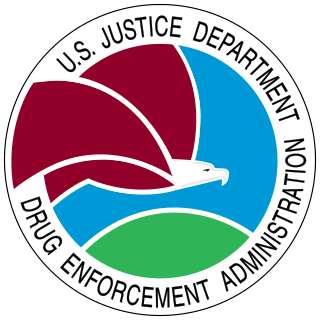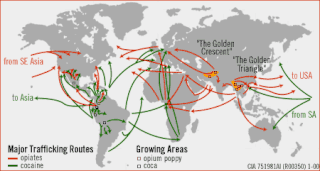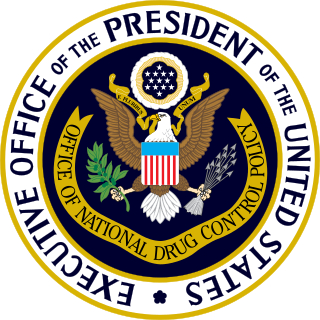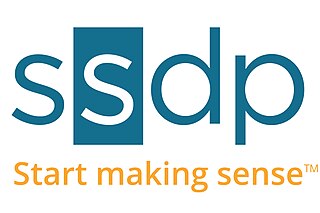Related Research Articles

The Office of Management and Budget (OMB) is the largest office within the Executive Office of the President of the United States (EOP). OMB's most prominent function is to produce the president's budget, but it also examines agency programs, policies, and procedures to see whether they comply with the president's policies and coordinates inter-agency policy initiatives.

The Drug Enforcement Administration is a United States federal law enforcement agency under the U.S. Department of Justice tasked with combating drug trafficking and distribution within the U.S. It is the lead agency for domestic enforcement of the Controlled Substances Act, sharing concurrent jurisdiction with the Federal Bureau of Investigation, the U.S. Immigration and Customs Enforcement, and U.S. Customs and Border Protection. The DEA has sole responsibility for coordinating and pursuing U.S. drug investigations both domestically and abroad.

The illegal drug trade or drug trafficking is a global black market dedicated to the cultivation, manufacture, distribution and sale of prohibited drugs. Most jurisdictions prohibit trade, except under license, of many types of drugs through the use of drug prohibition laws. The think tank Global Financial Integrity's Transnational Crime and the Developing World report estimates the size of the global illicit drug market between US$426 and US$652 billion in 2014 alone. With a world GDP of US$78 trillion in the same year, the illegal drug trade may be estimated as nearly 1% of total global trade. Consumption of illegal drugs is widespread globally and it remains very difficult for local authorities to thwart its popularity.

The Office of National Drug Control Policy (ONDCP) is a component of the Executive Office of the President of the United States.

Students for Sensible Drug Policy (SSDP) is an international non-profit advocacy and education organization. SSDP promotes global youth civic engagement as a tool in reforming drug policy.

The war on drugs is a global campaign, led by the U.S. federal government, of drug prohibition, military aid, and military intervention, with the aim of reducing the illegal drug trade in the United States. The initiative includes a set of drug policies that are intended to discourage the production, distribution, and consumption of psychoactive drugs that the participating governments and the UN have made illegal. The term was popularized by the media shortly after a press conference given on June 18, 1971, by President Richard Nixon—the day after publication of a special message from President Nixon to the Congress on Drug Abuse Prevention and Control—during which he declared drug abuse "public enemy number one". That message to the Congress included text about devoting more federal resources to the "prevention of new addicts, and the rehabilitation of those who are addicted" but that part did not receive the same public attention as the term "war on drugs". Two years prior to this, Nixon had formally declared a "war on drugs" that would be directed toward eradication, interdiction, and incarceration. In 2015, the Drug Policy Alliance, which advocates for an end to the War on Drugs, estimated that the United States spends $51 billion annually on these initiatives, and in 2021, after 50 years of the drug war, others have estimated that the US has spent a cumulative $1 trillion on it.
This article is intended to give an overview of several arguments for and against drug prohibition.

The National Institute on Drug Abuse (NIDA) is a United States federal-government research institute whose mission is to "advance science on the causes and consequences of drug use and addiction and to apply that knowledge to improve individual and public health."
The High Intensity Drug Trafficking Area program (HIDTA) is a drug-prohibition enforcement program run by the United States Office of National Drug Control Policy. It was established in 1990 after the Anti-Drug Abuse Act of 1988 was passed.

The Coast Guard Judge Advocate General oversees the delivery of legal services to the United States Coast Guard, through the Office of the Judge Advocate General in Washington, the Legal Service Command, offices in the Atlantic and Pacific Areas, nine Coast Guard Districts, the Coast Guard Academy, three training centers, and a number of other activities and commands. Legal services are delivered by Coast Guard judge advocates and civilian counsel in ten legal practice areas: criminal law/military justice, operations, international activities, civil advocacy, environmental law, procurement law, internal organizational law, regulations and administrative law, legislative support and legal assistance.

In the United States, the non-medical use of cannabis is legalized in 18 states and decriminalized in 13 states as of June 2021. Decriminalization refers to a policy of reduced penalties for cannabis offenses, typically involving a civil penalty for possessing small amounts, instead of criminal prosecution or the threat of arrest. In jurisdictions without penalty the policy is referred to as legalization, although the term decriminalization is sometimes used for this purpose as well.
A drug policy is the policy, usually of a government, regarding the control and regulation of psychoactive substances, particularly those that are addictive or cause physical and mental dependence. Governments try to combat drug addiction or dependence with policies that address both the demand and supply of drugs, as well as policies that mitigate the harms of drug use, and for medical treatment. Demand reduction measures include voluntary treatment, rehabilitation, substitution therapy, overdose management, alternatives to incarceration for drug related minor offenses, medical prescription of drugs, awareness campaigns, community social services, and support for families. Supply side reduction involves measures such as enacting foreign policy aimed at eradicating the international cultivation of plants used to make drugs and interception of drug trafficking, fines for drug offenses, incarceration for persons convicted for drug offenses. Policies that help mitigate drug use include needle syringe programs and drug substitution programs, and free facilities for testing a drug's purity.

The illegal drug trade in Colombia has, since the 1970s, centered successively on four major drug trafficking cartels: Medellin, Cali, Norte del Valle, and North Coast, as well as several bandas criminales, or BACRIMs. The trade eventually created a new social class and influenced several aspects of Colombian culture and politics.
The Joint Ocean Commission Initiative is a bipartisan, collaborative group in the United States that aims to "accelerate the pace of change that results in meaningful ocean policy reform." The Joint Initiative was established by the members of two major U.S.-based oceans commissions: the Pew Oceans Commission and the United States Commission on Ocean Policy. It was originally co-chaired by former White House Chief of Staff Leon Panetta and former Chief of Naval Operations Admiral James D. Watkins, chairs of the Pew and U.S. Ocean Commissions, respectively. Currently, the Joint Initiative is led by a Leadership Council, which is co-chaired by Christine Todd Whitman, former EPA Administrator under President George W. Bush and former governor of New Jersey, and Norman Y. Mineta, Secretary of Commerce under President Bill Clinton and Secretary of Transportation under President George W. Bush.
The American Council for an Energy-Efficient Economy (ACEEE) is a nonprofit, 501(c)(3) organization. Founded in 1980, ACEEE's mission is to act as a catalyst to advance energy efficiency policies, programs, technologies, investments, and behaviors in order to help achieve greater economic prosperity, and environmental protection.
The Office of Social Innovation and Civic Participation was an office new to the Obama Administration, created within the White House, to catalyze new and innovative ways of encouraging government to do business differently. Its first director was the economist Sonal Shah. The final director was David Wilkinson.
Drug trafficking organizations are defined by the United States Department of Justice as, "complex organizations with highly defined command-and-control structures that produce, transport, and/or distribute large quantity "Law enforcement reporting indicates that Mexican DTOs maintain drug distribution networks, or supply drugs to distributors, in at least 230 U.S. cities." The use of weapons and fear are commonplace in trafficking which often lead to other crimes in the process. The structures of many of these organizations are of a para-military nature using armed combatants to protect their stock of illegal drugs from growth to delivery.
The Office of the Assistant Secretary for Planning and Evaluation (ASPE) is the principal advisory group to the United States Secretary of the Department of Health and Human Services (HHS) on policy development and provides coordination and support for HHS's strategic and policy planning, planning and development of legislation, program evaluation, data gathering, policy-related research, and regulatory program. ASPE refers both to the position, the Assistant Secretary for Planning and Evaluation, and the office directed by that position. Since its authorization in 1965, ASPE has played an instrumental role as an internal strategy group, think tank, and incubator supporting the priorities and needs of the Secretary, and consequently, the Department as a whole.
The environmental impacts caused by the production of illicit drugs is an often neglected topic when analysing the effects of such substances. However, due to the clandestine nature of illicit drug production, its effects can be highly destructive yet difficult to detect and measure. The consequences differ depending upon the drug being produced but can be largely categorised into impacts caused by natural drugs or caused by synthetic/semi-synthetic drugs. Natural drugs refer to drugs which are primarily extracted from a natural source such as cocaine or cannabis. Synthetic drugs are produced from material that can't be found in nature and semi-synthetic drugs are made from both natural and synthetic materials such as methamphetamines and MDMA. Drug policy is a large determinant on how organisations produce drugs and thereby, how their processes affect the environment, thus prompting Government bodies to analyse the current drug policy. It is inevitable that solutions to such environmental impacts are synonymous with solutions to overall illicit drug production, however many have noted the reactionary measures undertaken by government bodies and elevate the need of preventative measures instead.
References
- ↑ Financial Services and General Government Appropriations for 2011: FY 2011 budget justifications: Executive Office of the President; the judiciary. U.S. Government Printing Office. 1 January 2008. p. 228.
The NMI was established in 2001
- ↑ "About Us". 13 November 2015.
- 1 2 "National HIDTA Assistance Center". www.nhac.org. Retrieved 2020-04-22.
- 1 2 3 "The National Marijuana Initiative". The National Marijuana Initiative. Retrieved 2020-03-26.
- ↑ Staff, N. M. I. (2019-01-08). "Owning or Investing in a Marijuana Business". The National Marijuana Initiative. Retrieved 2020-04-22.
- ↑ Staff, N. M. I. (2019-01-08). "Who's Really in Prison for Marijuana?". The National Marijuana Initiative. Retrieved 2020-04-23.
- ↑ "Environment". The National Marijuana Initiative. Retrieved 2020-04-23.
- ↑ "The Nation's Response to Medical Marijuana". November 17, 2017.